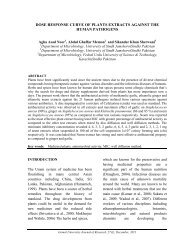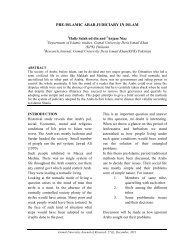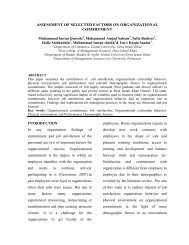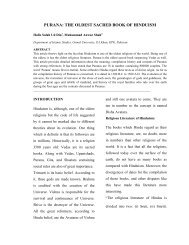a passage to india: the colonial discourse and ... - Gomal University
a passage to india: the colonial discourse and ... - Gomal University
a passage to india: the colonial discourse and ... - Gomal University
You also want an ePaper? Increase the reach of your titles
YUMPU automatically turns print PDFs into web optimized ePapers that Google loves.
44 Jajja, A Passage <strong>to</strong> India<br />
are represented as dirty, ugly people,<br />
who are associated with smell, <strong>to</strong>bacco<br />
<strong>and</strong> <strong>the</strong> sound of spitting. Their lack of<br />
etiquette is frightful. They put <strong>the</strong>ir<br />
melons in <strong>the</strong>ir fez, guavas in <strong>the</strong>ir<br />
<strong>to</strong>wels. The description is ironically<br />
summed up as, “<strong>the</strong> celebrated Oriental<br />
confusion”. The Raj officials invariably<br />
describe Indians as incapable of<br />
responsibility. The picnic arrangements<br />
are described as “odd”, <strong>the</strong> purdha<br />
carriage is made fun of as “comic”, <strong>the</strong><br />
Indians are shown not familiar with <strong>the</strong><br />
idea of traveling light, a pet word with<br />
Fielding. On <strong>to</strong>p of this confusion, <strong>the</strong><br />
Indian cook is shown making tea in <strong>the</strong><br />
lava<strong>to</strong>ry. Mrs. Moor makes her<br />
comment, “a strange place <strong>to</strong> make tea.<br />
The Indian hot wea<strong>the</strong>r is never<br />
forgotten. By May, a barrier of fire falls<br />
across India <strong>and</strong> <strong>the</strong> sea. Whereas <strong>the</strong><br />
British novelists <strong>and</strong> poets celebrate <strong>the</strong><br />
beauty of <strong>the</strong>ir countryside, here, <strong>the</strong><br />
narra<strong>to</strong>r laments that India is <strong>the</strong> country<br />
of “fields, fields, <strong>the</strong>n hills, jungle, hills<br />
<strong>and</strong> more fields”. This proves <strong>the</strong> point<br />
of Homi K. Bhabha.<br />
The <strong>to</strong>wns of “blasted” India are <strong>the</strong><br />
malaise of men, who cannot find <strong>the</strong>ir<br />
way home. India in <strong>the</strong> eyes of Forster<br />
is not a promise but only an appeal,<br />
indirectly justifying <strong>the</strong> Raj. There is<br />
only a half sentence reference <strong>to</strong> <strong>the</strong><br />
world celebrated Taj. The Mogul<br />
heritage in <strong>the</strong> form of gardens,<br />
mosques, forts, palaces is mere “Mogul<br />
stuff”. The dawn of India brings in its<br />
wake no miracles, but failure <strong>and</strong><br />
disappointment. It is more than that. It<br />
is described as failure of <strong>the</strong> virtue in <strong>the</strong><br />
celestial fount. The sun rises devoid of<br />
any splendor. India is only a horrid,<br />
stuffy place. The sun of India is<br />
treacherous; <strong>the</strong> month of April spreads<br />
lust like canker. The beauty of <strong>the</strong><br />
sunrise is only associated with, <strong>and</strong><br />
reserved for, <strong>the</strong> English Grasmere.<br />
“Ah, dearest Grasmere! Its little lakes<br />
<strong>and</strong> mountains were beloved by <strong>the</strong>m all.<br />
Romantic yet manageable, it sprang<br />
from a kindlier planet”. While G<strong>and</strong>hi<br />
(Narayan,2000) declares <strong>the</strong> flowing<br />
rivers of India as beautiful <strong>and</strong> finds <strong>the</strong><br />
sunrise full of colours <strong>and</strong> <strong>the</strong> air so<br />
fresh .In Forster’s India, <strong>the</strong> plane is<br />
untidy. A Pakistani writer Zulfiqar<br />
Ghose in preface <strong>to</strong> The Murder of Aziz<br />
declares <strong>the</strong> Indian l<strong>and</strong>scape <strong>to</strong> be <strong>the</strong><br />
most beautiful l<strong>and</strong>scape in <strong>the</strong> world.<br />
At <strong>the</strong> sight of picnic, <strong>the</strong> presence of<br />
elephant attracts villagers <strong>and</strong> “naked<br />
babies”.<br />
The ability of <strong>the</strong> Indians <strong>to</strong> fabricate<br />
<strong>and</strong> invent s<strong>to</strong>ries, which do not exist,<br />
is ano<strong>the</strong>r construction of <strong>the</strong><br />
Orientalists. It is maintained that <strong>the</strong><br />
Indians don’t bo<strong>the</strong>r <strong>to</strong> verify <strong>the</strong> fact<br />
<strong>and</strong> can invent a snake out of a stick <strong>to</strong><br />
create a sensation. The Oriental fool<br />
Aziz, cannot see <strong>the</strong> difference between<br />
hospitality <strong>and</strong> intimacy.<br />
The Marabar caves are bl<strong>and</strong> <strong>and</strong> bald,<br />
even <strong>the</strong> sky which connects <strong>the</strong><br />
precipices is bl<strong>and</strong> <strong>and</strong> glutinous. Mrs.<br />
Moor, who is portrayed as a<br />
compassionate figure, <strong>and</strong> is regarded by<br />
some critics as sympa<strong>the</strong>tic <strong>to</strong>wards<br />
India <strong>and</strong> Indians, but actually is neoassimilative<br />
imperial mode <strong>to</strong> perpetuate<br />
<strong>the</strong> empire, finds <strong>the</strong> caves as “horrid”.<br />
The presence of so many Indians in <strong>the</strong><br />
caves only fills <strong>the</strong>m smell. She<br />
experiences <strong>the</strong> crush <strong>and</strong> <strong>the</strong> stench.<br />
Something vile <strong>and</strong> naked strikes her<br />
face, which actually turns out <strong>to</strong> be only<br />
<strong>the</strong> soft h<strong>and</strong> of an infant. Through <strong>the</strong><br />
metaphor of echo, India is portrayed as a<br />
body which lacks discrimination <strong>and</strong><br />
discernment. What ever you shower<br />
India with, hope, politeness, anything,<br />
<strong>the</strong> outcome (echo) is <strong>the</strong> same<br />
mono<strong>to</strong>nous noise. The images, Indian<br />
<strong>Gomal</strong> <strong>University</strong> Journal of Research, 29(1). June 2013











